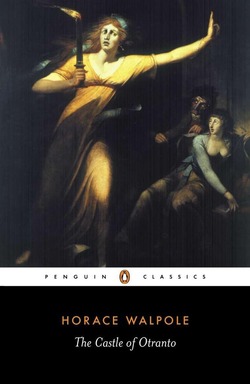On its first publication, The Castle of Otranto (1764) was attributed to a translation by William Marshall from the Italian of Onuphrio Muralto. Supposedly found “in the library of an ancient catholic family in the north of England” and dated to 1529, with its story reaching further back, it was only in the second edition that Walpole confessed his ruse. In this version he subtitled it A Gothic Story, and thus a literary genre, along with those titles that would come soon after, was born.
In Italy, the principality of Otranto is ruled by the tyrannical Manfred, the third generation of a line that took the seat from Alfonso the Good. As it opens, Manfred’s only son, Conrad, is due to marry the reluctant Isabella when he, by seemingly supernatural means, is crushed by a giant helmet falling from the sky. In need of a son Manfred surmises the logical solution is to divorce his current wife, Hippolita, and marry Isabella for himself. Obviously she’s even more opposed to this idea than on the marriage to Conrad, and so she escapes with the help of a peasant who, it appears, harbours a secret. From there it’s a riot of confused identities, major reveals, ancient prophecies, and ghostly appearances.
The five chapters that make up the book may as well have been called acts as the book carries more than a whiff of the theatrical. There’s little internalisation from the characters, who speak loudly and in a dated fashion, but plenty of melodramatic action as ladies excessively swoon. But a debt is clearly owed to Shakespeare too as there are many references, as well as reminiscent scenes, that recall, among others, Macbeth, Hamlet, and Romeo and Juliet.
Although it’s an important work in the history of the Gothic literature – the Gothic ground zero, if you will – it’s not the most engaging of stories, at least to modern sensibilities, but it’s a nonetheless enjoyable romp through a medieval past full of tropes that would come to exemplify the genre: the supernatural; the romantic; a gloomy atmosphere; and, of course, the ancient and isolated castle full of secret passages and unhappy people awaiting their fate.
